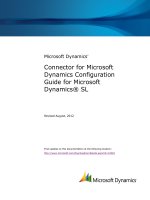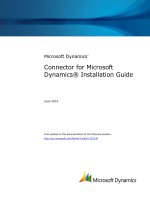Microsoft Dynamics CRM 2013 Planning Guide
Bạn đang xem bản rút gọn của tài liệu. Xem và tải ngay bản đầy đủ của tài liệu tại đây (1.08 MB, 147 trang )
Microsoft Dynamics CRM 2013 Planning
Guide
Version 6.1.0
1
1
This document is provided "as-is". Information and views expressed in this document, including
URL and other Internet Web site references, may change without notice.
Some examples depicted herein are provided for illustration only and are fictitious. No real
association or connection is intended or should be inferred.
This document does not provide you with any legal rights to any intellectual property in any
Microsoft product. You may copy and use this document for your internal, reference purposes.
The videos and eBooks are in English only. Also, if you click the links, you may be redirected to a
U.S. website whose content is in English.
© 2014 Microsoft Corporation. All rights reserved.
Microsoft, Active Directory, ActiveX, Azure, BizTalk, JScript, Microsoft Dynamics, Outlook,
SharePoint, SQL Server, Visual Basic, Visual Studio, Windows, Windows Server, and Windows
Vista are trademarks of the Microsoft group of companies. All other trademarks are property of
their respective owners.
2
Contents
3
Planning Guide for Microsoft Dynamics CRM
2013 and Microsoft Dynamics CRM Online
IT Pros and CRM administrators can use the resources and topics in this guide to help them plan
an on-premises deployment of Microsoft Dynamics CRM 2013 and to help in planning to use
Microsoft Dynamics CRM Online.
In This Section
Planning Your Deployment of Microsoft Dynamics CRM 2013 and Microsoft Dynamics CRM
Online
Microsoft Dynamics CRM 2013 editions and licensing
What's new in Microsoft Dynamics CRM 2013 and Microsoft Dynamics CRM Online
Microsoft Dynamics CRM system requirements and required technologies
Planning Deployment of Microsoft Dynamics CRM 2013
Planning Deployment of Microsoft Dynamics CRM 2013 Advanced Topics
Related Sections
Installing Guide for Microsoft Dynamics CRM 2013 and Microsoft Dynamics CRM Online
Administration Guide for Microsoft Dynamics CRM 2013 and Microsoft Dynamics CRM
Online
Operating Guide for Microsoft Dynamics CRM 2013 (on-premises)
Customization Guide for Microsoft Dynamics CRM 2013 and Microsoft Dynamics CRM
Online
Report Writers Guide for Microsoft Dynamics CRM 2013 and Microsoft Dynamics CRM
Online
Send us your comments about this
document
If you have a question or comment about this document, click to send an e-mail message to the
Microsoft Dynamics CRM content team.
If your question is about Microsoft Dynamics CRM products, and not about the content of this
book, search the Microsoft Help and Support Center or the Microsoft Knowledge Base.
4
Planning Your Deployment of Microsoft
Dynamics CRM 2013 and Microsoft
Dynamics CRM Online
For larger organizations, planning Microsoft Dynamics CRM 2013 or Microsoft Dynamics CRM
Online, like any enterprise-wide software, is a significant task. This guide is written for the team of
people responsible for planning Microsoft Dynamics CRM, and provides information and tools
that are needed to design a successful implementation. In smaller organizations, several roles
may be filled by one person. In larger organizations, each role may be divided among several
people. These roles include the following:
• Business managers. Responsible for determining how your business will use Microsoft Dynamics
CRM. This includes mapping your processes to Microsoft Dynamics CRM, deciding on default values,
and identifying any required customizations.
• Customization technical staff. Responsible for implementing the planned customizations.
• Network technical staff. Responsible for determining how Microsoft Dynamics CRM will be
deployed on the network and how users will access the system.
• Project manager. Responsible for managing an enterprise-wide implementation project.
Organizations that implement Microsoft Dynamics CRM software may use the services of an
independent software vendor (ISV) or value-added reseller, a consultant, or other organization
that is partnered with Microsoft and will help you with implementing and maintaining your
Microsoft Dynamics CRM installation. Because of this assumption, there may be references in
this guide to these "partners" who are expected to provide services to you.
Resources for planning and preparing users for
Microsoft Dynamics CRM
These resources are available to help you plan a deployment of Microsoft Dynamics CRM 2013
or Microsoft Dynamics CRM Online.
Microsoft Dynamics SureStep
Microsoft Dynamics Sure Step is a full customer lifecycle methodology for all Microsoft Dynamics
solutions, providing the Microsoft ecosystem with comprehensive sales through delivery
guidance, project management discipline alignment and field-driven best practices. Microsoft
Dynamics Sure Step is designed for Microsoft Dynamics Partners to successfully and reliably
complete customer projects on time and on budget. More information: Microsoft Dynamics CRM
Sure Step Guide
5
Manage your Microsoft Dynamics CRM Online subscription
If you’re an administrator who needs to plan and implement Microsoft Dynamics CRM Online in
your organization, the Manage your Microsoft Dynamics CRM Online subscription is designed for
you. The guide also helps other users to ramp up with Microsoft Dynamics CRM Online.
User training and adoption
More information: Training and Adoption Kit for Microsoft Dynamics CRM.
See Also
Planning Guide for Microsoft Dynamics CRM 2013 and Microsoft Dynamics CRM Online
Microsoft Dynamics CRM 2013 editions and licensing
Microsoft Dynamics CRM 2013 editions and
licensing
Microsoft Dynamics CRM offers licensing options that cover implementations for small, to mid-
level, to even very large organizations.
Editions and licensing for on-premises
deployments
• Microsoft Dynamics CRM Server 2013. There is no user limit for this edition. Additional features
include support for multiple organizations, multiple server instances, and separate role-based service
installation. Role-based services let you increase performance by installing component services on
different computers. Users of the Professional edition can be granted full access to all features and
customization areas.
• Microsoft Dynamics CRM Workgroup Server 2013. This edition is limited to five, or fewer, users.
This version is limited to a single organization and a single computer that is running Microsoft
Dynamics CRM 2013. Users of the Basic edition have the same access as the Essential edition, plus
they can be granted access to accounts, contacts, cases, leads, reporting, personal dashboards, and
visualizations.
Licensing
A Microsoft Dynamics CRM deployment operates by using a single product key. However, each
Microsoft Dynamics CRM Server in a Microsoft Dynamics CRM 2013 deployment requires a
server license. Only the Microsoft Dynamics CRM Server 2013 edition is licensed for multiple
6
Microsoft Dynamics CRM 2013 servers or server roles in a deployment. Microsoft Dynamics CRM
Workgroup Server 2013 edition is limited to running on a single server in a deployment.
You can view and upgrade a license in Deployment Manager. Deployment Manager is a Microsoft
Management Console (MMC) snap-in that system administrators can use to manage
organizations, servers, and licenses for deployments of Microsoft Dynamics CRM.
Client Access License Types
You can view and modify client access license types for each user in the Users area of the
Settings area in the Microsoft Dynamics CRM web client. For more information about Microsoft
Dynamics CRM 2013 licensing, see How to buy Microsoft Dynamics.
You can view and upgrade a license in Deployment Manager. Deployment Manager is a Microsoft
Management Console (MMC) snap-in that deployment administrators can use to manage
organizations, servers, and licenses for deployments of Microsoft Dynamics CRM.
Microsoft Dynamics CRM Online licensing
With Microsoft Dynamics CRM Online, you get powerful CRM capabilities and features delivered
as a cloud service from Microsoft, providing instant-on, anywhere access, and predictable pay-as-
you-go pricing. Licensing plans for Microsoft Dynamics CRM Online determine the amount of
features and functionality users need and is licensed using a subscription.
For licensing plan information, see Licensing plans for Microsoft Dynamics CRM Online.
See Also
Planning Your Deployment of Microsoft Dynamics CRM 2013 and Microsoft Dynamics CRM
Online
What's new in Microsoft Dynamics CRM 2013 and Microsoft Dynamics CRM Online
What's new in Microsoft Dynamics CRM 2013
and Microsoft Dynamics CRM Online
Microsoft Dynamics CRM 2013 and Microsoft Dynamics CRM Online include several new
features that offer flexibility, scalability, and ease of use.
In This Section
What’s new in Microsoft Dynamics CRM 2013 Service Pack 1 and Microsoft Dynamics CRM
Online Spring ’14?
What’s new in Microsoft Dynamics CRM 2013?
7
What’s new in Microsoft Dynamics CRM 2013
Service Pack 1 and Microsoft Dynamics CRM
Online Spring ’14?
Ready to upgrade to the latest? This topic describes what’s new in Microsoft Dynamics CRM
2013 Service Pack 1 and Microsoft Dynamics CRM Online Spring ‘14.
What's new for administrators in Microsoft Dynamics CRM 2013 and CRM Online
What’s new in Microsoft Dynamics CRM 2013?
This topic provides information to help you plan your upgrade from Microsoft Dynamics CRM
2011 to Microsoft Dynamics CRM 2013.
What’s changed in the Microsoft Dynamics CRM 2013 release?
New Microsoft Dynamics CRM 2013 application features
New Microsoft Dynamics CRM 2013 (on-premises) deployment features
What’s changed in the Microsoft Dynamics CRM 2013 release?
In support of the latest technologies and in compliance with the Microsoft Support Lifecycle,
obsolete platform products and technologies will no longer be supported in Microsoft Dynamics
CRM 2013. More information: What’s changing in the next major release
New Microsoft Dynamics CRM 2013 application features
Here are some new application features included with Microsoft Dynamics CRM 2013.
• Improved user interface. Much of the user interface has been improved to provide better touch
support, drive efficiencies, and minimize the number of window popups.
• Database encryption. Organization database encryption is enabled for a set of default entity attributes
that contain sensitive information, such as user names and email passwords. This feature can help
organizations meet FIPS 140-2 compliance. Encryption keys can be viewed and changed in Microsoft
Dynamics CRM. More information: Data Encryption
• Mobile apps. Access important customer information from your phone or tablet with the new
smartphone and tablet apps. For more information, see CRM for Tablets and Phones. For device
support, see Mobile phone support for Microsoft Dynamics CRM 2013 and Microsoft Dynamics CRM
Online and Tablet support for Microsoft Dynamics CRM 2013 and CRM Online.
New Microsoft Dynamics CRM 2013 (on-premises) deployment
features
This section lists new deployment features available with Microsoft Dynamics CRM 2013 (on-
premises).
8
Volume Shadow Service (VSS) support
The Volume Shadow Service (VSS) Writer service provides support for Data Protection Manager
to simplify data backup and recovery. More information: Microsoft Dynamics CRM 2013 VSS
Writer
Server-side synchronization
Server-side synchronization provides server-to-server synchronization of email messages, tasks,
contacts, and appointments between Microsoft Dynamics CRM 2013 and Microsoft Exchange
Server or POP3/SMTP email systems. To use this functionality you don’t have to install and
maintain a separate application. More information: Introducing Server-Side Synchronization
Microsoft Dynamics CRM 2013 Best Practices Analyzer
The Microsoft Dynamics CRM 2013 Best Practices Analyzer is a diagnostic tool that gathers
information from installed Microsoft Dynamics CRM 2013 server roles and builds a report of best
practices and recommended solutions based on the existing deployment. More information:
Microsoft Dynamics CRM 2013 Best Practices Analyzer (BPA)
Defer the base and extension table merge as part of upgrade
As part of the upgrade from Microsoft Dynamics CRM 2011 to Microsoft Dynamics CRM 2013, all
organization databases will have the entitynameBase and entitynameExtensionBase tables
merged into a single entitynameBase table. Reducing the number of tables in the organization
database can improve overall performance of transactional operations in CRM.
However, for enterprise customers with organization databases having large and complex
customizations or solutions, the table merge may take several hours to complete. You can
perform the merge as a separate operation to reduce application downtime caused by the
upgrade. More information: Run the Base and Extension table merge as a separate operation
See Also
Planning Guide for Microsoft Dynamics CRM 2013 and Microsoft Dynamics CRM Online
Microsoft Dynamics CRM 2013 editions and licensing
Microsoft Dynamics CRM system requirements and required technologies
What's new for administrators in Microsoft Dynamics CRM 2013 and CRM Online
What's new for customization
9
Microsoft Dynamics CRM system
requirements and required technologies
Microsoft Dynamics CRM Online reduces the system requirements of traditional on-premises
deployments by operating all the infrastructure and platform essentials in the cloud. At a glance,
the minimum software requirements for users and administrators of Microsoft Dynamics CRM
Online includes the following:
• Windows operating system when you use CRM for Outlook. Apple Mac, when running Apple Safari,
supported tablet, or mobile device.
• Supported web browser, such as later versions of Internet Explorer or the latest versions of Apple
Safari, Google Chrome and Mozilla Firefox.
• Microsoft Office Outlook (optional).
Microsoft Dynamics CRM 2013 on-premises versions have a much larger requirement for both
hardware and software than Microsoft Dynamics CRM Online. Microsoft Dynamics CRM 2013 on-
premises versions require the software listed previously plus the following software:
• Microsoft Windows Server
• A Microsoft Windows Server Active Directory infrastructure
• An Internet Information Services (IIS) website
• Microsoft SQL Server 2008 or Microsoft SQL Server 2012
• Microsoft SQL Server 2008 Reporting Services or Microsoft SQL Server 2012 Reporting Services
• Microsoft Exchange Server or access to a POP3-compliant email server (optional)
• SharePoint Server (required for document management)
• Claims-based security token service (required for Internet-facing deployments)
• Windows operating system when you use CRM for Outlook. Apple Mac, when running Apple Safari,
supported tablet, or mobile device.
• Supported web browser, such as later versions of Internet Explorer or the latest versions of Apple
Safari, Google Chrome and Mozilla Firefox.
• Microsoft Office Outlook (optional).
10
Note
For detailed hardare and software requirements or specific product versions and service
pack levels that are supported, see the links in “In this Section” later in this topic.
Typically, Microsoft Dynamics CRM applications support the latest version and service
pack (SP) for all required components, such as Windows Server, Microsoft SQL Server,
and Microsoft Office. However, to fully support the latest version of a required component,
you should apply the latest update for Microsoft Dynamics CRM. For information about
the latest update, see Microsoft Dynamics CRM 2013 updates and hotfixes.
For the compatibility status of the required or optional components that are updated, see
Microsoft Dynamics CRM Compatibility List.
Microsoft Dynamics CRM 2013 matches the support policy for all dependent products
and technologies, such as Microsoft Office or Microsoft Exchange Server. For example,
mainstream support for Microsoft Office 2010 ends 10/13/2015; therefore mainstream
support for CRM for Outlook running on Microsoft Office 2010 also ends on that date. For
more information, see Select a Product for Lifecycle Information.
Before you install Microsoft Dynamics CRM 2013, review the following topics, which provide
detailed information about the products and technologies that are required or optional for
Microsoft Dynamics CRM 2013.
In This Section
Microsoft Dynamics CRM Server 2013 hardware requirements
Microsoft SQL Server hardware requirements for Microsoft Dynamics CRM Server 2013
Software requirements for Microsoft Dynamics CRM Server 2013
Microsoft Dynamics CRM 2013 Reporting Extensions requirements
SharePoint Document Management software requirements for Microsoft Dynamics CRM 2013
Lync and Skype integration with Microsoft Dynamics CRM 2013
Microsoft Dynamics CRM Email Router hardware requirements
Microsoft Dynamics CRM Email Router software requirements
Microsoft Dynamics CRM for Outlook hardware requirements
Microsoft Dynamics CRM for Outlook software requirements
Tablet support for Microsoft Dynamics CRM 2013 and CRM Online
Mobile phone support for Microsoft Dynamics CRM 2013 and Microsoft Dynamics CRM Online
64-bit supported configurations for Microsoft Dynamics CRM 2013
Microsoft Dynamics CRM 2013 language support
11
Important
See Also
What's new in Microsoft Dynamics CRM 2013 and Microsoft Dynamics CRM Online
Planning Deployment of Microsoft Dynamics CRM 2013
Microsoft Dynamics CRM Server 2013
hardware requirements
The following table lists the minimum and recommended hardware requirements for Microsoft
Dynamics CRM Server 2013 running in a Full Server configuration. These requirements assume
that additional components such as Microsoft SQL Server, Microsoft SQL Server Reporting
Services, SharePoint, or Microsoft Exchange Server aren’t installed or running on the system.
Component *Minimum *Recommended
Processor x64 architecture or compatible dual-core 1.5 GHz
processor
Quad-core x64 architecture 2 GHz CPU or higher
such as AMD Opteron or Intel Xeon systems
Memory 2-GB RAM 8-GB RAM or more
Hard disk
10 GB of available hard disk space
Note
Computers with more than 16GB of RAM
will require more disk space for paging,
hibernation, and dump files.
40 GB or more of available hard disk space
Note
Computers with more than 16GB of RAM
will require more disk space for paging,
hibernation, and dump files.
* Actual requirements and product functionality may vary based on your system configuration and
operating system.
Running Microsoft Dynamics CRM on a computer that has less than the recommended
requirements may result in inadequate performance.
The minimum and recommended requirements are based on 320-user load simulation tests.
See Also
Microsoft Dynamics CRM system requirements and required technologies
Microsoft SQL Server hardware requirements for Microsoft Dynamics CRM Server 2013
12
Microsoft SQL Server hardware requirements
for Microsoft Dynamics CRM Server 2013
Microsoft SQL Server database engine and Microsoft SQL Server Reporting Services are
required to install and run on-premises versions of Microsoft Dynamics CRM 2013. The following
table lists the minimum and recommended hardware requirements for Microsoft SQL Server.
These requirements assume that additional components such as Microsoft Dynamics CRM 2013,
Microsoft SQL Server Reporting Services, SharePoint, or Microsoft Exchange Server aren’t
installed or running on the system.
Component *Minimum *Recommended
Processor x64 architecture or compatible dual-core 1.5
GHz processor
Quad-core x64 architecture 2 GHz CPU or
higher such as AMD Opteron or Intel Xeon
systems
Memory 4-GB RAM 16-GB RAM or more
Hard disk SAS RAID 5 or RAID 10 hard disk array SAS RAID 5 or RAID 10 hard disk array
* Actual requirements and product functionality may vary based on your system configuration and
operating system.
Maintaining Microsoft Dynamics CRM databases on a computer that has less than the
recommended requirements may result in inadequate performance.
The minimum and recommended requirements are based on 320-user load simulation tests.
See Also
Microsoft Dynamics CRM system requirements and required technologies
Microsoft Dynamics CRM Server 2013 hardware requirements
Software requirements for Microsoft Dynamics CRM Server 2013
Software requirements for Microsoft
Dynamics CRM Server 2013
This section lists the software and application requirements for Microsoft Dynamics CRM Server
2013.
13
In This Topic
Windows Server operating system
Supported Windows Server 2012 editions
Supported Windows Server 2008 editions
Server virtualization
Active Directory modes
Internet Information Services (IIS)
SQL Server editions
Accessing Microsoft Dynamics CRM from the Internet - Claims-based authentication and IFD
requirements
SQL Server Reporting Services
Software component prerequisites
Verify prerequisites
Windows Server operating system
Microsoft Dynamics CRM Server 2013 can be installed only on Windows Server 2008 or
Windows Server 2012 64-bit-based computers. The specific versions and editions of Windows
Server that are supported for installing and running Microsoft Dynamics CRM Server 2013 are
listed in the following sections.
The following Windows Server versions are not supported for installing and running
Microsoft Dynamics CRM Server 2013:
• Windows Server 2012 Foundation
• Windows Server 2012 Essentials
• Microsoft Windows Small Business Server editions
• The Windows Server 2003 family of operating systems
Supported Windows Server 2012 editions
The following editions of the Windows Server 2012 operating system are supported for installing
and running Microsoft Dynamics CRM Server 2013:
• Windows Server 2012 R2 Datacenter
• Windows Server 2012 R2 Standard
• Windows Server 2012 Datacenter
14
Important
• Windows Server 2012 Standard
Running on Windows Server 2012 R2 requires Microsoft Dynamics CRM 2013 Update
Rollup 2.
Supported Windows Server 2008 editions
The following editions of the Windows Server 2008 operating system are supported for installing
and running Microsoft Dynamics CRM Server 2013:
• Windows Server 2008 Standard SP2 (x64 versions) or Windows Server 2008 Standard R2 SP1
• Windows Server 2008 Enterprise SP2 (x64 versions) or Windows Server 2008 Enterprise R2 SP1
• Windows Server 2008 Datacenter SP2 (x64 versions) or Windows Server 2008 Datacenter R2 SP1
• Windows Web Server 2008 SP2 (x64 versions) or Windows Web Server 2008 R2 SP1
• Windows Server 2008 installed by using the Server Core installation option is not supported for
installing and running Microsoft Dynamics CRM 2013 Server.
• Windows Server 2008 for Itanium-based systems isn’t supported for installing and running Microsoft
Dynamics CRM Server 2013.
Server virtualization
Microsoft Dynamics CRM servers can be deployed in a virtualized environment by using
Windows Server 2008 or Windows Server 2012 with Hyper-V or virtualization solutions from
vendors who participate in the Microsoft Windows Server Virtualization Validation Program
(SVVP). You must understand the limitations and best practices of server virtualization before you
try to virtualize your installation of Microsoft Dynamics CRM. For information about Hyper-V, see
the Microsoft Virtualization website.
Active Directory modes
The computer that Microsoft Dynamics CRM Server 2013 is running on must be a member in a
domain that is running in one of the following Active Directory directory service forest and domain
functional levels:
• Windows Server 2003 Interim
• Windows Server 2003 Native
15
Important
Important
• Windows Server 2008 Interim
• Windows Server 2008 Native
• Windows Server 2012
• Windows Server 2012 R2
For more information about Active Directory domain and forest functional levels, see the Active
Directory Domains and Trusts Microsoft Management Console (MMC) snap-in Help.
• The computer that Microsoft Dynamics CRM is running on shouldn’t function as an Active Directory
domain controller.
• When you use the Add Users Wizard, only users from trusted domains in the current forest will be
displayed. Users from trusted external forests aren’t supported and don’t appear in the wizard.
• Installing Microsoft Dynamics CRM 2013 Server in an LDAP directory that is running in Active
Directory Application Mode (ADAM) is not supported.
• Running in Windows Server 2012 R2 mode requires Microsoft Dynamics CRM 2013 Update Rollup 2.
Internet Information Services (IIS)
Microsoft Dynamics CRM Server 2013 supports Internet Information Services (IIS) versions 7,
7.5, 8.0, and 8.5.
We recommend that you install and run IIS in Native Mode before you install Microsoft Dynamics
CRM Server 2013. However, if IIS is not installed and it is required for a Microsoft Dynamics CRM
server role, Microsoft Dynamics CRM Server Setup will install it.
Microsoft Dynamics CRM can’t use a website that has more than one http or https
binding. Although IIS supports multiple http and https bindings, there is a limitation in
using additional bindings with Windows Communication Foundation (WCF). WCF is
required when you use CRM for Outlook. Before you install or upgrade, you must
remove the additional bindings from the website used for Microsoft Dynamics CRM or
select a different website.
SQL Server editions
Any one of the following Microsoft SQL Server editions is required and must be installed on
Windows Server 2008 (x64 SP2 or R2) versions or Windows Server 2012 (64x RTM or R2) 64-
bit-based computers, running, and available for Microsoft Dynamics CRM:
16
Important
Important
• Microsoft SQL Server 2008, Standard Edition, x64 SP3 or R2 SP2
• Microsoft SQL Server 2008, Enterprise Edition, x64 SP3 or R2 SP2
• Microsoft SQL Server 2008 Datacenter x64 SP3 or R2 SP2
• Microsoft SQL Server 2008 Developer x64 SP3 or R2 SP2 (for non-production environments only)
• Microsoft SQL Server 2012, Enterprise, 64-bit SP1
• Microsoft SQL Server 2012, Business Intelligence, 64-bit SP1
• Microsoft SQL Server 2012, Standard, 64-bit SP1
• 32-bit versions of Microsoft SQL Server 2008 or Microsoft SQL Server 2012 database engine are not
supported for this version of Microsoft Dynamics CRM.
• Microsoft SQL Server 2008 Workgroup, Web, Compact, or Microsoft SQL Server 2008 Express
Edition editions are not supported for use with Microsoft Dynamics CRM 2013 Server.
• Microsoft SQL Server 2000 and Microsoft SQL Server 2005 editions and are not supported for this
version of Microsoft Dynamics CRM.
• Running 64-bit Microsoft SQL Server 2008 versions for Itanium (IA-64) systems in conjunction with
Microsoft Dynamics CRM will receive commercially reasonable support. Commercially reasonable
support is defined as all reasonable support efforts by Microsoft Support that do not require Microsoft
Dynamics CRM code fixes. Microsoft Dynamics CRM 2013 supports a named instance of Microsoft
SQL Server for configuration and organization databases.
• Running on Windows Server 2012 R2 requires Microsoft Dynamics CRM 2013 Update Rollup 2.
Accessing Microsoft Dynamics CRM from the
Internet - Claims-based authentication and IFD
requirements
The following items are required or recommended for Internet-facing deployment (IFD). This topic
assumes you will be using Active Directory Federation Services (AD FS) as the security token
service (STS). For more information about configuring Microsoft Dynamics CRM for claims-based
authentication, download the Claims-based Authentication White Paper from the Microsoft
Download Center.
17
Important
Important
Exposing the Microsoft Dynamics CRM website to the Internet is not supported unless
claims-based authentication is used and Microsoft Dynamics CRM is configured for IFD.
Similarly, Outlook Anywhere (RPC over HTTP) is not supported as a solution to connect
CRM for Outlook to an on-premises deployment of Microsoft Dynamics CRM 2013 over
the Internet. The on-premises deployment of Microsoft Dynamics CRM 2013 must be
configured for IFD as described in the topic Configure a Microsoft Dynamics CRM
Internet-facing deployment.
In order for Microsoft Dynamics CRM for tablets to successfully connect to a new
deployment of Microsoft Dynamics CRM Server 2013, you must run a Repair of Microsoft
Dynamics CRM Server 2013 on the server running IIS where the Web Application Server
role is installed after the Internet-Facing Deployment Configuration Wizard is successfully
completed. For repair instructions, see Uninstall, change, or repair Microsoft
Dynamics CRM Server 2013.
• The computer where Microsoft Dynamics CRM 2013 Server is installed must have access to a security
token service (STS) service, such as Active Directory Federation Services (AD FS) federation server.
Microsoft Dynamics CRM 2013 Server supports Active Directory Federation Services (AD FS) 2.0,
2.1, and 2.2 versions.
• Note the following conditions for the web components before you configure IFD:
• If you are installing Microsoft Dynamics CRM in a single server configuration, be aware that
Active Directory Federation Services 2.0 installs on the default website. Therefore, you must
create a new website for Microsoft Dynamics CRM.
• When you run the Internet-Facing Deployment Configuration Wizard, Microsoft Dynamics CRM
2013 Server must be running on a website that is configured to use Secure Sockets Layer (SSL).
Microsoft Dynamics CRM Server Setup will not configure the website for SSL.
• We recommend that the website where the Microsoft Dynamics CRM 2013 web application will
be installed has the “Require SSL” setting enabled in IIS.
• The website should have a single binding. Multiple IIS bindings, such as a website with an
HTTPS and an HTTP binding or two HTTPS or two HTTP bindings, are not supported for
running Microsoft Dynamics CRM.
• Access to the Active Directory Federation Services (AD FS) federation metadata file from the
computer where the Configure Claims-Based Authentication Wizard is run. Note the following:
• The federation metadata endpoint must use the web services trust model (WS-Trust)
1.3 standard. Endpoints that use a previous standard, such as the WS-Trust 2005
standard, are not supported. In Active Directory Federation Services 2.0, all WS-Trust
1.3 endpoints contain /trust/13/ in the URL path.
• Encryption certificates. The following encryption certificates are required. You can use the same
encryption certificate for both purposes, such as when you use a wildcard certificate:
18
If you use a certificate that is created by using a custom certificate request, the
template that was used must be the Legacy key template. Custom certificate
requests created by using the CNG key template are incompatible with Microsoft
Dynamics CRM. For more information about custom certificate request
templates, see Create a Custom Certificate Request.
• Claims encryption. Claims-based authentication requires identities to provide an
encryption certificate for authentication. This certificate should be trusted by the
computer where you are installing Microsoft Dynamics CRM 2013 Server so it must
be located in the local Personal store where the Configure Claims-Based
Authentication Wizard is running.
• SSL (HTTPS) encryption. The certificates for SSL encryption should be valid for host
names similar to org.contoso.com, auth.contoso.com, and dev.contoso.com. To
satisfy this requirement you can use a single wildcard certificate (*.contoso.com), a
certificate that supports Subject Alternative Names, or individual certificates for each
name. Individual certificates for each host name are only valid if you use different
servers for each web server role. Multiple IIS bindings, such as a website with two
HTTPS or two HTTP bindings, aren’t supported for running Microsoft Dynamics
CRM. For more information about available options, contact your certification
authority service company or your certification authority administrator.
• The CRMAppPool account of each Microsoft Dynamics CRM website must have read permission to
the private key of the encryption certificate specified when configuring claims-based authentication.
You can use the Certificates snap-in to edit permissions for the encryption certificate found in the
Personal store of the local computer account.
SQL Server Reporting Services
Specific Microsoft SQL Server Reporting Services editions are used for reporting functionality.
Any one of the following Microsoft SQL Server editions is required and must be installed on
Windows Server 2008 (x64 SP2 or R2) versions or Windows Server 2012 (x64 RTM or R2) 64-
bit-based computers, running and available for Microsoft Dynamics CRM:
• Microsoft SQL Server 2008, Standard Edition, x64 SP3 or R2 SP2
• Microsoft SQL Server 2008, Enterprise Edition, x64 SP3 or R2 SP2
• Microsoft SQL Server 2008 Datacenter x64 SP3 or R2 SP2
• Microsoft SQL Server 2008 Developer x64 SP3 or R2 SP2 (for non-production environments only)
• Microsoft SQL Server 2012, Enterprise, 64-bit SP1
• Microsoft SQL Server 2012, Business Intelligence, 64-bit SP1
19
Important
• Microsoft SQL Server 2012, Standard, 64-bit SP1
• 32-bit versions of Microsoft SQL Server 2008 or Microsoft SQL Server 2012 Reporting Services are
not supported for this version of Microsoft Dynamics CRM.
• Microsoft SQL Server 2008 Workgroup, Web, Compact, or Microsoft SQL Server 2008 Express
Edition editions are not supported for use with Microsoft Dynamics CRM 2013 Server.
• Running 64-bit Microsoft SQL Server 2008 versions for Itanium (IA-64) systems in conjunction with
Microsoft Dynamics CRM will receive commercially reasonable support. Commercially reasonable
support is defined as all reasonable support efforts by Microsoft Support that do not require Microsoft
Dynamics CRM code fixes.
• Microsoft SQL Server 2008 Workgroup is not supported for running the Microsoft Dynamics CRM
Reporting Extensions. This is because Microsoft SQL Server 2008 Workgroup does not support
custom data extensions. Therefore, features such as creating, running, or scheduling Fetch-based or
SQL-based reports will not work.
• Using a Microsoft SQL Server 2012 Reporting Services server running in SharePoint mode is not
supported with Microsoft Dynamics CRM. For more information about Microsoft SQL Server 2012
Reporting Services SharePoint mode, see Install Reporting Services SharePoint Mode as a Single
Server Farm.
• Running on Windows Server 2012 R2 requires Microsoft Dynamics CRM 2013 Update Rollup 2.
Software component prerequisites
The following SQL Server components must be installed and running on the computer that is
running SQL Server before you install Microsoft Dynamics CRM 2013 Server:
• SQL word breakers
This is only required for some Microsoft Dynamics CRM language editions. For more
information about word breaker versions for languages supported by SQL Server see
Configure and Manage Word Breakers and Stemmers for Search.
• SQL Server Agent service
• SQL Server full-text indexing
The following components must be installed and running on the computer where Microsoft
Dynamics CRM 2013 Server will be installed:
• Services
• Indexing Service
20
Important
To install this service, see the Windows Server documentation.
• IIS Admin
• World Wide Web Publishing
• Windows Data Access Components (MDAC) 6.0 (This is the default version of MDAC with Windows
Server 2008.)
• Microsoft ASP.NET (Must be registered, but does not have to be running.)
Verify prerequisites
Before you install Microsoft Dynamics CRM 2013 Server, you should understand the following:
• Microsoft SQL Server can be, but is not required to be, installed on the same computer as Microsoft
Dynamics CRM 2013 Server.
• If Microsoft Dynamics CRM 2013 Server and Microsoft SQL Server are installed on different
computers, both computers must be in the same Active Directory directory service domain.
• Microsoft SQL Server can be installed by using either Windows Authentication or mixed-mode
authentication. (Windows Authentication is recommended for increased security and Microsoft
Dynamics CRM will use only Windows Authentication).
• The service account that SQL Server uses to log on to the network must be either a domain user
account (recommended) or one of the built-in system accounts supported by SQL Server (Network
Service, Local Service, or Local System). Installation of Microsoft Dynamics CRM will fail if the SQL
Server service account is the local administrator Installation of Microsoft Dynamics CRM will fail if
the SQL Server service account is the local administrator.
• The SQL Server service must be started and can be configured to automatically start when the
computer is started.
• The Microsoft SQL Server Reporting Services service must be started and configured to automatically
start when the computer is started.
• The SQL Server Agent service must be started. This service can be configured to automatically start
when the computer is started.
• Although it is optional, we recommend that you accept the SQL Server default settings for Collation
Designator, Sort Order, and SQL Collation. Microsoft Dynamics CRM supports both case-sensitive
and case-insensitive sort orders.
• Microsoft Dynamics CRM Server Setup requires at least one network protocol to be enabled to
authenticate by using SQL Server. By default, TCP/IP protocol is enabled when you install SQL
Server. You can view network protocols in SQL Server Configuration Manager.
21
See Also
Microsoft SQL Server hardware requirements for Microsoft Dynamics CRM Server 2013
Microsoft Dynamics CRM 2013 Reporting Extensions requirements
Microsoft Dynamics CRM 2013 updates and hotfixes
Microsoft Dynamics CRM 2013 Reporting
Extensions requirements
Microsoft Dynamics CRM Reporting Extensions are data processing extensions that are installed
on the Microsoft SQL Server Reporting Services server. The Microsoft Dynamics CRM Reporting
Extensions accept the authentication information from Microsoft Dynamics CRM Server 2013 and
passes it to the Microsoft SQL Server Reporting Services server.
Microsoft Dynamics CRM Reporting Extensions Setup includes two data processing extensions:
Fetch data processing extension and SQL data processing extension. By default, these
extensions are installed during Microsoft Dynamics CRM Reporting Extensions Setup.
• The Fetch data processing extension is required to create, run, and schedule Fetch-based reports.
• The SQL data processing extension is required to run and schedule the default (out-of-box) or SQL-
based custom reports in Microsoft Dynamics CRM 2013.
You don’t need Microsoft Dynamics CRM Reporting Extensions to run Microsoft Dynamics CRM
2013. However, if you want to create, use, or schedule reports in Microsoft Dynamics CRM, you
must install Microsoft Dynamics CRM Reporting Extensions. Additionally, you have to install it if
you want to create an organization or import an organization, such as when you migrate from
Microsoft Dynamics CRM 2011 to Microsoft Dynamics CRM 2013 by using Deployment Manager.
In this topic
Microsoft Dynamics CRM Reporting Extensions general requirements
Microsoft Dynamics CRM Reporting Authoring Extension general requirements
Microsoft Dynamics CRM Reporting Extensions general
requirements
The Microsoft Dynamics CRM Reporting Extensions component has the following general
requirements:
• You must complete Microsoft Dynamics CRM Server Setup before you run Microsoft Dynamics CRM
Reporting Extensions Setup.
• You can install and run Microsoft Dynamics CRM Reporting Extensions on only one instance of
22
Microsoft SQL Server Reporting Services on a computer.
• The identity account running the instance of Microsoft SQL Server Reporting Services where the
Microsoft Dynamics CRM Reporting Extensions are running can’t be the local system or a virtual
account. This is required for Microsoft Dynamics CRM reporting to work because the identity account
must be added to the PrivReportingGroup Active Directory security group that is used by Microsoft
Dynamics CRM.
• Separate deployments of Microsoft Dynamics CRM cannot share one Microsoft SQL Server Reporting
Services server. However, a single deployment of Microsoft Dynamics CRM that has multiple
organizations can use the same Microsoft SQL Server Reporting Services server.
• You must run the Microsoft Dynamics CRM Reporting Extensions Setup on a computer that has
Microsoft SQL Server 2008 Reporting Services, Microsoft SQL Server 2008 R2 Reporting Services or
Microsoft SQL Server 2012 Reporting Services installed.
• For smaller data sets and fewer users, you can use a single-server deployment or a multiple-server
deployment. With larger datasets or more users, performance decreases quickly when complex reports
are run. Use a multi-server deployment with one computer that is running SQL Server for Microsoft
Dynamics CRM, and another server for Microsoft SQL Server Reporting Services.
Microsoft Dynamics CRM Reporting Authoring Extension
general requirements
The Microsoft Dynamics CRM Report Authoring Extension has the following general
requirements:
• Make sure that you install the Microsoft Dynamics CRM Report Authoring Extension on the same
computer that has Business Intelligence Development Studio installed.
• If your organization uses Microsoft Office 365, make sure that the computer on which the Microsoft
Dynamics CRM Report Authoring Extension is installed also has the Microsoft Online Services Sign-
in Assistant installed on it. If Microsoft Online Services Sign-in Assistant is already installed, check
the registry key SOFTWARE\Microsoft\MSOIdentityCRL and make sure that the TargetDir registry
key in MSOIdentityCRL contains msoidcli.dll.
Additional Microsoft Dynamics CRM Report Authoring Extension software requirements
If the following components are missing, they will be installed by Microsoft Dynamics CRM Report
Authoring Extension Setup:
• Visual Studio 2008 Service Pack 2
• Business Intelligence Development Studio
See Also
Microsoft Dynamics CRM system requirements and required technologies
23
Software requirements for Microsoft Dynamics CRM Server 2013
SharePoint Document Management software requirements for Microsoft Dynamics CRM 2013
SharePoint Document Management software
requirements for Microsoft Dynamics CRM
2013
If you want to use Microsoft SharePoint document management functionality with Microsoft
Dynamics CRM Server 2013 or Microsoft Dynamics CRM Online, you must meet the following
requirements.
In This Topic
Using document management in Microsoft Dynamics CRM 2013 on-premises
Using document management in Microsoft Dynamics CRM Online
Microsoft Dynamics CRM 2013 List Component for Microsoft SharePoint
Using document management in Microsoft
Dynamics CRM 2013 on-premises
One of the following versions of Microsoft SharePoint must be available.
• Microsoft SharePoint 2013 or Microsoft SharePoint 2013 SP1
• Microsoft SharePoint 2010 SP1 or SP2
• Microsoft SharePoint Online
A SharePoint site collection. You also have to have at least one site collection configured and
available for Microsoft Dynamics CRM.
Microsoft Dynamics CRM 2013 list component. For Microsoft Dynamics CRM documents that
are stored on SharePoint to appear in a format that has the look and feel of Microsoft Dynamics
CRM, and to have automatic folder creation in SharePoint, the Microsoft Dynamics CRM 2013 list
component, a SharePoint solution, must be installed to the SharePoint site collection. More
information: Microsoft Dynamics CRM 2013 List Component for Microsoft SharePoint
Microsoft SharePoint Foundation 2013 versions aren’t supported for use with Microsoft
Dynamics CRM 2013 document management.
24
Important
You can’t use Internet Explorer 7 with Microsoft Dynamics CRM (on-premises) document
management deployments that use SharePoint 2013. For more information, see Plan
browser support in SharePoint 2013.
Currently, Server-based SharePoint integration is not supported with Microsoft Dynamics
CRM (on-premises).
The user who accesses SharePoint from CRM must have appropriate permissions on the
SharePoint site collection where the document management components are installed. For more
information about how to grant membership on a site collection, see the SharePoint Help.
Using document management in Microsoft
Dynamics CRM Online
One of the following versions of Microsoft SharePoint must be available.
• Microsoft SharePoint 2013 or Microsoft SharePoint 2013 SP1
• Microsoft SharePoint 2010 SP1 or SP2
• Microsoft SharePoint Online
A SharePoint site collection. You also have to have at least one site collection configured and
available for Microsoft Dynamics CRM.
The list component is not required if you use server-based SharePoint integration. Although the
Microsoft Dynamics CRM List Component is the default document management configuration
option, we recommend that you enable server-based SharePoint integration, a feature that’s
available in Microsoft Dynamics CRM Online Spring ‘14. More information: Server-based
SharePoint integration
On-premises versions of SharePoint require the Microsoft Dynamics CRM List
Component, and currently aren’t supported for server-based SharePoint integration.
Microsoft SharePoint Foundation 2013 versions aren’t supported for use with Microsoft
Dynamics CRM 2013 document management.
You can’t use Internet Explorer 7 with Microsoft Dynamics CRM (on-premises) document
management deployments that use SharePoint Online. For more information, see Plan
browser support in SharePoint 2013.
The user who accesses SharePoint from CRM must have appropriate permissions on the
SharePoint site collection where the document management components are installed. For more
information about how to grant membership on a site collection, see the SharePoint Help.
25
Important

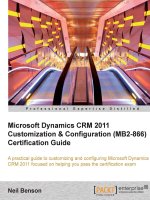
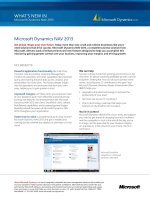
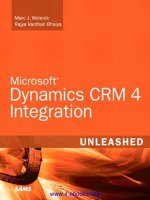
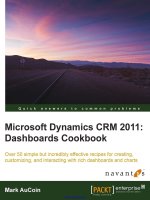
![maximizing your sales with microsoft dynamics crm 2011 [electronic resource]](https://media.store123doc.com/images/document/14/y/ir/medium_irp1401358930.jpg)


